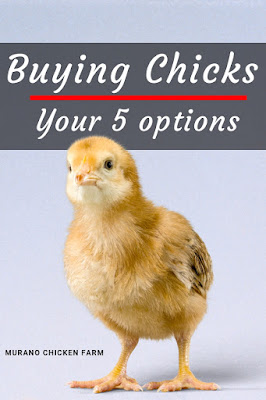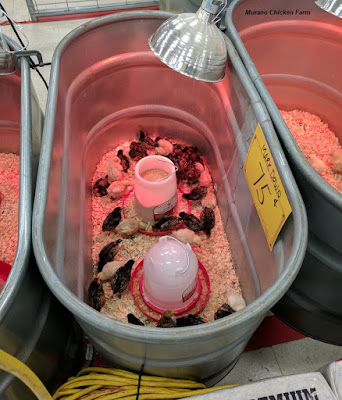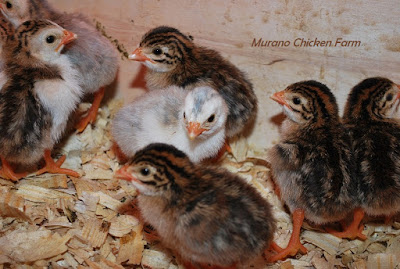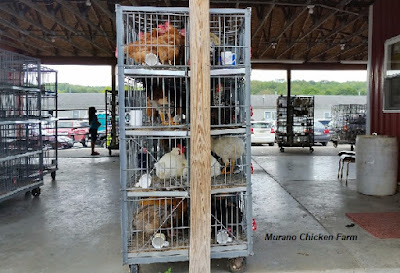If you chose to go with a more personal option like breeders and local farmers, then you'll also have the chance to learn more about the breed and your particular chicks. However if you go with one of the large hatcheries, you'll get to pick from a larger number of breeds. Plus there's the expense to consider as some options are cheaper than others.
So, how do you decide?
Buying chicks: where to get them
Feed store: This is the most enticing since you have to go to the feed store anyway and they're so darn cute! Feed store chicks are hatchery chicks though, so if you have an objection to buying from a commercial hatchery, then skip the feed store chicks.
Since big chains like TSC and Rural King sell thousands of chicks each season, they tend to only get the most popular egg layers, meat birds and a few bantys. Some smaller stores will let you order from the hatchery they use and add it to their order. Most feed stores have a minimum purchase of 4-6 chicks, but many don't.
Unfortunately if you're looking for information on chick care many feed store employees won't be able to help you outside of helping you with what brooder supplies to buy. They are not trained in poultry care and will know nothing about breed characteristics except what's in the hatchery descriptions. You also run the risk of getting a chick from the wrong bin as they sometimes get mixed up.Unless the feed store has a year round chick section or employees who also happen to be chicken keepers, you probably won't get much info on your chicks. However, they do have chicks every day during spring and early summer, so you can keep checking back to see if they get in a breed you want. Plus the prices are usually pretty low to begin with, then drop lower after the chicks are there a week or so.
Commercial hatchery: Hatcheries are a great option for someone who wants to order a whole flock and mix and match breeds. Since chicks are being shipped through the mail, a minimum number of 20-25 chicks is necessary to insure they are warm enough during the trip. The hatchery will sometimes slip in a few extra chicks (called packing peanuts) for warmth. These extras are almost always cockerels.
You have a reasonable expectation that the chicks will arrive healthy and most hatcheries will replace the chicks or refund your money if the chicks do not survive the shipping process. Breeds will be purebred but they will not be show quality. Hatcheries are the only chick buying option where you can order vaccinations to be done on the chicks before they are sent to you.
The chicks will be arriving through the mail, so you'll need to be ready to pick them up from the post office immediately on delivery day. If you have the time to check their websites daily, you can often find sales when they are overstocked.
Private breeder: If you want to get into showing or breeding, this is where you want to purchase your starter flock. Some breeders will ship chicks but many prefer to only deal locally. Many breeders charge on a sliding scale with birds priced by quality. A show quality chicken will get a higher price than a pet quality bird.
Breeders can be an great source of information on the breed and it's care. Many will spend time chatting with you about the chicks, the parent stock and their care. The breeder/buyer relationship is very important to most breeders and many will answer questions long after the sale is complete. They will also be happy to hatch a custom order when you're ready to buy more chicks.
You can find local breeders through word of mouth, by checking community bulletin boards at feed stores, through Craigslist or social media sites like Facebook. If you want to have chicks shipped look for national directories and breeders clubs online. For instance, I'm listed on the Guinea Fowl International breeders list. A google search will help you find the club for whichever breed you're interested in.
Poultry swap: Poultry swaps are basically buy-sell-trade events. Most of the sellers are local breeders, so you can often find rare breeds that are high quality. You'll also find a lot of flock owners just trying to get rid of extra barnyard mix chicks, often for a great price. These are a good way to get to know others in the chicken community along with picking up a few chicks or laying hens.
I talk all about poultry swaps in the post: What to expect at a chicken swap (you might be surprised). Since you're dealing with individual flock owners there will be no minimum amount of chicks you must purchase. However, there are no guarantees that the birds will be healthy and disease free so use your best judgement. Prices are often negotiable.
You can find poultry swaps through local groups online and on signs at feed stores that host the swaps.
Poultry auction: If you have a livestock auction near you then you can probably pick up a bunch of chicks for an amazing price! If you've never been to a poultry auction before check out this post: What to expect at a poultry auction.
There are a few downsides to auctions though: there is no guarantee of health and you don't always know the sex of chicks or the breed. Sometimes chicks are simply labeled something like '6 yellow chicks' or '3 bantams', so you'll have to guess what you're getting. While you can score a lot of chicks for a cheap price, it's often a gamble on what they'll grow up to be. That can be fun though!
Over the years I have bought chicks from all 5 of these places and I must admit that I've had mixed results. I've literally had good and bad results from every single option on this list! I tend to get my favorite birds from breeders, though that may just be because I'm so excited to get a new breed that I baby them and they end up being spoiled rotten! lol Where is your favorite place to buy chicks?
~L
Ready to start making money on your small flock? Check out my $250 a week breeding plan.
Want information on raising chickens sent right to your email weekly? Click right here to join my list and get new posts sent directly to you the day they're published ... plus, you'll also get 4 free downloads including '25 Ways to save money raising chickens'.






No comments:
Post a Comment